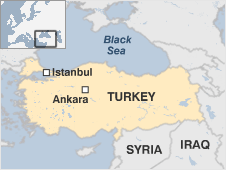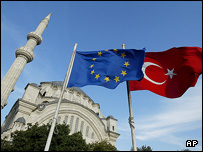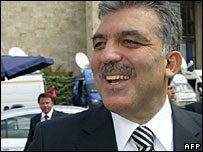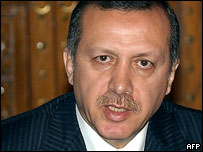 |
Once the centre of the Ottoman Empire the modern secular republic was established in the 1920s by nationalist leader Kemal Ataturk.
Straddling the continents of Europe and Asia Turkey's strategically important location has given it major influence in the region - and control over the entrance to the Black Sea.
Overview
Turkey's progress towards democracy and a market economy was halting in the decades following the death of President Ataturk in 1938. The army saw itself as the guarantor of the constitution and ousted governments on a number of occasions when it thought they were challenging secular values.
Efforts to reduce state control over the economy also faced many obstacles. After years of mounting difficulties which brought the country close to economic collapse a tough recovery programme was agreed with the IMF in 2002. Since then Turkey has seen strong economic growth and a dramatic fall in inflation. However huge foreign debt and unemployment remain major burdens.

Turkey must meet strict conditions for EU membership
|
Turkey's powerful military - which sees itself as the guardian of the secular system - has a long history of involvement in politics.
In recent years as Ankara has set its sights firmly on European Union membership the profile of the military has been lower in public life. Secularists concerned about the intentions of the Islamist-rooted Justice and Development Party government since 2002 have increasingly turned to the courts.
In March 2008 the Constitutional Court only narrowly rejected a petition by the chief prosecutor to ban the Justice and Development Party and 71 of its officials including President Abdullah Gul and Prime Minister Recep Tayyip Erdogan for allegedly seeking to establish an Islamic state.
Turkey has long been at odds with its close neighbour Greece over territorial disputes in the Aegean and the divided island of Cyprus.
It became an EU candidate country in 1999 and in line with EU requirements went on to introduce substantial human rights and economic reforms. The death penalty was abolished tougher measures were brought in against torture and the penal code was overhauled.
Reforms were introduced in the areas of women's rights and Kurdish culture language education and broadcasting. Women's rights activists have said the reforms do not go far enough and have accused the government of lacking full commitment to equality and acting only under EU pressure.
After intense bargaining EU membership talks were launched in October 2005. Accession negotiations are expected to take about 10 years. So far the going has not been easy.
The breakthrough came just weeks after Turkey agreed to recognise Cyprus as an EU member in spite of unfavourable comment over its declaration that this was not tantamount to full diplomatic recognition.
Turkey is home to a sizeable Kurdish minority which by some estimates constitutes up to a fifth of the population. However they complain that the government has tried to destroy their Kurdish identity and that they suffer from economic disadvantage and human rights violations.
The Kurdistan Workers Party (PKK) the best known and most radical of the Kurdish movements launched a guerrilla campaign in 1984 for an ethnic homeland in the Kurdish heartland in the southeast. Thousands died and hundreds of thousands became refugees in the ensuing conflict with the PKK which Turkey the US and the European Union deem a terrorist organisation.
The past few years have seen an upsurge in attacks which had subsided after the 1999 capture of PKK leader Abdullah Ocalan. The government launched its "Kurdish initiative" in 2009 in an effort to mollify Kurdish opinion by extending linguistic and cultural rights. The Ataturkist opposition Republican People's Party (CHP) indicated that it would support these measures in the hope of ending support for separatist attacks.
Facts
- Full name: Republic of Turkey
- Population: 74.8 million (UN 2009)
- Capital: Ankara
- Largest city: Istanbul
- Area: 779452 sq km (300948 sq miles)
- Major language: Turkish
- Major religion: Islam
- Life expectancy: 69 years (men) 74 years (women) (UN)
- Monetary unit: Turkish lira
- Main exports: Clothing and textiles fruit and vegetables iron and steel motor vehicles and machinery fuels and oils
- GNI per capita: US $9340 (World Bank 2008)
- Internet domain: .tr
- International dialling code: +90
Leaders
President: Abdullah Gul
Abdullah Gul was chosen as president by parliament in August 2007 after months of controversy over his nomination. He is Turkey's first head of state with a background in political Islam in a country with strong secularist principles.

Abdullah Gul
|
The months leading to his eventual election saw street demonstrations an opposition boycott of parliament early parliamentary elections and warnings from the army which has ousted four governments since 1960.
Turkish secularists including army generals opposed Gul's nomination fearing he would try to undermine Turkey's strict separation of state and religion. Secularists also did not want Turkey's First Lady to wear the Muslim headscarf.
The army top brass and the main opposition Republican People's Party stayed away from Mr Gul's swearing-in ceremony.
Mr Gul started in politics in an Islamist party that was banned by the courts but later renounced the idea that Islam should be a driving force in politics. In 2001 along with other moderate members of the Islamist movement he founded the Justice and Development Party (AK Party) and distanced himself from his past political leanings.
The party won elections in 2002 and Mr Gul served as stand-in prime minister before stepping aside for Recep Tayyip Erdogan. Mr Gul served as foreign minister under Mr Erdogan and cultivated an image as a moderate politician acting as an impassioned voice for reforms to promote Turkey's EU bid.
The government holds most power but the president can veto laws appoint officials and name judges. Voters in a referendum in October 2007 backed plans to have future presidents elected by the people instead of by parliament.
Prime minister: Recep Tayyip Erdogan
Tayyip Erdogan who became premier in March 2003 led his Justice and Development Party (AK Party) to victory in the July 2007 elections.

Prime Minister Erdogan has set his sights on EU entry
|
Erdogan called the poll early after the army-backed secular elite blocked his choice of an ex-Islamist ally as the next president.
The AK Party boosted its share of the vote in the 2007 parliamentary elections to 47% despite opposition efforts to portray his pro-business party which has Islamist roots as a Trojan horse set to turn Turkey into an Iran-style theocracy.
Mr Erdogan's governments have continued reforms and the modernisation of the country if anything faster and more effectively than most of their predecessors.
Mr Erdogan first became prime minister several months after his party's landslide election victory in November 2002.
He had been barred from standing in the poll because of a previous criminal conviction for reading an Islamist poem at a political rally. Changes to the constitution paved the way for him to run for parliament in 2003.
He identified EU entry as a top priority and introduced reforms which paved the way for the opening of membership talks in October 2005.
Although the AK has Islamist roots he insists that it is committed to a secular state. From a lowly background Mr Erdogan worked as a street seller to help pay for an education. He attended Koranic school before studying economics at university.
As mayor of Istanbul in the mid 1990s he banned alcohol in municipal buildings and won popularity for improving services.
Media
Turkey's airwaves are lively with some 300 private TV stations - more than a dozen of them with national coverage - and more than 1000 private radio stations competing with the state broadcaster TRT.
Powerful businesses operate many of the press and broadcasting outlets; they include the Dogan group the leading media conglomerate.
For journalists the military Kurds and political Islam are highly-sensitive topics coverage of which can lead to arrest and prosecution. Rights groups say journalists have been imprisoned or attacked by police. It is also common for radio and TV stations to have their broadcasts suspended for airing sensitive material.
Some of the most repressive sanctions have been lifted as part of reforms intended to pave the way for EU entry. But under Article 301 of the penal code it remains a crime to insult the Turkish nation.
TRT introduced broadcasts in Kurdish banned for many years in 2004 as a part of reforms intended to meet EU criteria on minorities. Kurdish-language TRT 6 TV launched in 2009. Some overseas-based Kurdish TVs broadcast via satellite.
Around 26.5 million Turks were online by March 2008 (Internetworldstats). Internet sites have been subject to blocking. They include video-sharing service YouTube which was banned over videos deemed to be insulting to the founder of modern Turkey Kemal Ataturk.
The press
- Hurriyet - mass-circulation daily English-language web pages
- Milliyet - mass-circulation daily
- Cumhuriyet - left-wing daily
- The New Anatolian - English-language
- Today's Zaman - English-language version of daily
- Yeni Asir - daily
- Sabah - daily English-language pages
Television
- Turkish Radio and Television (TRT) - state broadcaster operates four national networks
- Star TV - private the first station to break state TV's monopoly
- Show TV - private widely-watched network
- Kanal D - private widely-watched network
- ATV - private
- Fox - private
- NTV - private
- CNN Turk - Turkish offshoot of well-known news channel
Radio
- Turkish Radio and Television (TRT) - state broadcaster services include cultural/educational network TRT 1 popular music network TRT 3 and Turkish folk/classical music station TRT 4
- Kral FM - popular private network
-
Super FM - popular private network
AFRICA | ASIA-PACIFIC | AMERICAS | EUROPE | MIDDLEEAST | SOUTHASIA
Mauritania Mauritius Morocco Mozambique Namibia Niger Nigeria Republic-of-congo Rwanda Sao-tome-and-principe Senegal Seychelles Sierra-leone Somalia South-africa Sudan Swaziland Tanzania The-gambia Togo Tunisia Uganda zambia Zimbabwe Australia Brunei Burma Cambodia China East-timor Fiji Indonesia Japan Kazakhstan Kiribati Kyrgyzstan Laos Malaysia Marshall-islands Micronesia Mongolia Nauru New-zealand North-korea Palau Papua-new-guinea Samoa Singapore Solomon-islands South-korea Taiwan Tajikistan Thailand The-philippines Tonga Turkmenistan Tuvalu Uzbekistan Vanuatu Vietnam Antigua-and-barbuda Argentina Bahamas Barbados Belize Bolivia Brazil Canada Chile Colombia Costa-rica Cuba Dominica Dominican-republic Ecuador El-salvador Grenada Guatemala GuyanaHaiti Honduras Jamaica Mexico Nicaragua Panama Paraguay Peru St-kitts-and-nevis St-lucia St-vincent-and-the-grenadines Suriname Trinidad-and-tobago United-states-of-america Uruguay Venezuela Albania Andorra Armenia Austria Azerbaijan Belarus Belgium Bosnia-hercegovina Bulgaria Croatia Cyprus Czech-republic Denmark Estonia Finland France Georgia Germany Greece Hungary Iceland Ireland Italy Latvia Liechtenstein Lithuania Luxembourg Macedonia Malta Moldova Monaco Montenegro Norway Poland Portugal Russia San-marino Serbia Slovakia Slovenia Spain Sweden Switzerland The-netherlands Turkey Ukraine United-kingdom Vatican Algeria Egypt Iran Iraq Israel-and-palestinian-territories Jordan Kuwait Lebanon Libya Mauritania Oman Saudi-arabia Sudan Syria Tunisia United-arab-emirates Yemen Afghanistan Bangladesh Bhutan India Nepal Pakistan Sri-Lanka The-Maldives

